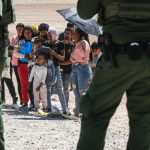
In the middle of the night on Friday, the Tunisian government forced hundreds of migrants and refugees to leave camps in the city of Tunis
In the middle of the night on Friday, the Tunisian government forced hundreds of migrants and refugees to leave camps in the city of Tunis. A group called the Tunisian Forum for Social and Economic Rights (FTDES) told people about this.
The Camps and Their Residents
For many months, up to 700 migrants from countries in sub-Saharan Africa lived in temporary tent camps in an area called Lac 1, near the Gulf of Tunis. Many of them had run away from other cities in Tunisia after people were mean to them. This started when the President of Tunisia, Kais Saied, said bad things about migrants in February 2023. He called them “hordes” and said they were a danger to Tunisia.
The Overnight Raid
The spokesman for FTDES, Romdhane Ben Amor, said at least 300 migrants were forced to leave in the middle of the night. This included women and children. The police came around 3 AM and tore down the camps. They wanted to send the migrants to the Algerian border.
A Desperate Situation
Ben Amor said some migrants were able to run away before the police came. Others escaped on the way to the Beja region near Algeria. But he said some very vulnerable people were forced out, including those protected by international rules and people who needed medical help. They had already been living in very bad conditions for months.
Political Pressure and Concerns
These expulsions happened just days after a visit by the Prime Minister of Italy, Giorgia Meloni. She is very against migration. During her visit, agreements were made to try to stop migrants from going from Tunisia to Italy. Meloni’s party is expected to lead campaigns for European elections in June, with stopping migration as a major issue.
The Tunisian President had also recently said Tunisia should not be a place for migrants from other African countries to stay or pass through. This, along with Meloni’s views, worries people about how migrants will be treated and if their human rights will be violated.







